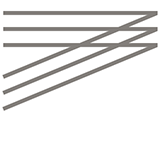Introduction
Pforzheim University is a well-known public university of applied sciences in Baden-Württemberg, Germany. It has significant advantages in professional fields such as modeling, engineering, and business management. It is one of the leading universities in Germany. Cultivated a large number of professional technical and management talents.
Overview
Student size: more than 5,000 students.
Curriculum: Covering many undergraduate and master's degree majors such as industrial design, transportation design, fashion and popular culture, video communications, fashion design, machinery manufacturing, electronic technology and information technology, and economic engineering.
History and establishment time
The school was founded in 1877 and has its origins in two universities - the Art Institute and the Technical School for the Metalworking Industry. In 1963 the Faculty of Business was founded, and in 1992 the Faculty of Engineering was founded and merged with two other faculties to form today's University of Applied Sciences Pforzheim.
School running strength
Faculty: The school has a high-quality faculty. The teachers not only have a solid academic background, but also have rich practical experience and industry connections. They can provide students with teaching content that combines theory and practice to help students better understand the subject. Adapt to the needs of future career development.
Teaching resources: The school is equipped with advanced teaching facilities and laboratories, providing good conditions for students' learning and research. In addition, the school has established close cooperative relationships with many companies to provide students with internships, practical projects and employment opportunities, so that students can accumulate practical work experience during their studies and improve their employment competitiveness.
Nature of institution
Public university of applied sciences.
educational philosophy
It emphasizes interdisciplinary, innovative, practical and internationalization, focuses on cultivating students' comprehensive abilities and social responsibility, encourages students to think about problems from different perspectives, actively participate in practical activities, and improve their ability to solve practical problems to adapt to the ever-changing society and society. Economic development needs.
Key laboratories and disciplines
Key disciplines: International management, modeling and engineering are the school’s dominant disciplines. Among them, the master's degree in international management is in a leading position in Germany, and the MBA business administration program has obtained AACSB and AQAS certification, ranking among the top ten international master's programs in Germany.
Key laboratories: The school has not been found to have any officially recognized key laboratories, but the school is equipped with professional experimental facilities and practice sites in related disciplines to support teaching and scientific research activities.
Faculty
The school has three colleges: the School of Design, the School of Technology, and the School of Economics and Law, covering multiple disciplines such as design, engineering, economics, and law.
Ranking
In the first German domestic university professional rankings conducted by the German Higher Education Development Center CHE, the school's Master of International Management major is in the leading position in Germany. The school ranks fifth among 18 comprehensive universities and universities of applied sciences in terms of teaching conditions.
cost
German public universities usually do not charge tuition fees, but students need to pay a semester fee of about 300 euros per semester for student services and facility maintenance. In addition, students need to bear their own expenses such as accommodation, living expenses, and study materials.
campus
Campus location: The main campus is located in the south of Pforzheim, Baden-Württemberg, Germany. The city is located at the northern end of the Black Forest, close to the German-French border, and adjacent to large cities such as Stuttgart and Karlsruhe, with convenient transportation. It has a developed economy and rich historical and cultural heritage and natural landscapes.
Campus facilities: The campus has modern teaching buildings, libraries, laboratories, studios and other teaching facilities, as well as living facilities such as canteens and dormitories, providing students with a good learning and living environment. The school's library has a rich collection of books and provides students with a wealth of learning resources. In addition, the school also has a number of student organizations and clubs, providing students with a variety of extracurricular life and communication opportunities.
-

Heidelberg University
-

University of Freiburg
-

University of Jena
-

University of Marburg
-

University of Rostock
-

University of Halle-Wittenberg
-

University of Bayreuth
-

Leipzig University
-

University of Tübingen
-

Humboldt University of Berlin
-

Mesoamerican University
-

Istmo University
-

Mariano Galvez University of Guatemala
-

Regional University of Guatemala
-

Galileo University
-

Francisco Marroquín University
-

Rafael Landívar University
-

University of the Valley of Guatemala
-

University of San Carlos of Guatemala
-

Technological Institute of Tlaxcala Plateau
-

Golfo University
-

Technological University of South Sonora
-

Technological University of Huejotzingo
-

Tizimín Institute of Technology
-

Chilpancingo Institute of Technology

